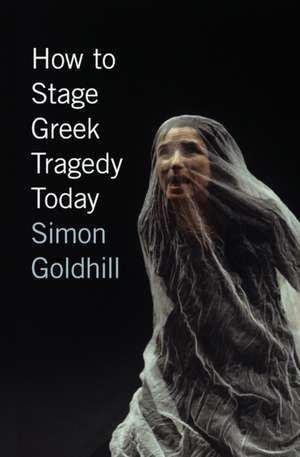How to Stage Greek Tragedy Today
Autor Simon Goldhillen Limba Engleză Paperback – 15 noi 2007
From the stages of Broadway and London to university campuses, Paris, and the bourgeoning theaters of Africa, Greek tragedy remains constantly in production. This global revival, in addition to delighting audiences, has highlighted both the promise and the pitfalls of staging ancient masterpieces in the modern age. Addressing the issues and challenges these performances pose, renowned classicist Simon Goldhill responds here to the growing demand for a comprehensive guide to staging Greek tragedy today.
In crisp and spirited prose, Goldhill explains how Aeschylus, Euripides, and Sophocles conceived their works in performance and then summarizes everything we know about how their tragedies were actually staged. The heart of his book tackles the six major problems facing any company performing these works today: the staging space and concept of the play; the use of the chorus; the actor’s role in an unfamiliar style of performance; the place of politics in tragedy; the question of translation; and the treatment of gods, monsters, and other strange characters of the ancient world. Outlining exactly what makes each of these issues such a pressing difficulty for modern companies, Goldhill provides insightful solutions drawn from his nimble analyses of some of the best recent productions in the United States, Britain, and Continental Europe.
One of the few experts on both Greek tragedy and contemporary performance, Goldhill uses his unique background and prodigious literary skill to illuminate brilliantly what makes tragedy at once so exciting and so tricky to get right. The result will inspire and enlighten all directors and performers—not to mention the growing audiences—of ancient Greek theater.
In crisp and spirited prose, Goldhill explains how Aeschylus, Euripides, and Sophocles conceived their works in performance and then summarizes everything we know about how their tragedies were actually staged. The heart of his book tackles the six major problems facing any company performing these works today: the staging space and concept of the play; the use of the chorus; the actor’s role in an unfamiliar style of performance; the place of politics in tragedy; the question of translation; and the treatment of gods, monsters, and other strange characters of the ancient world. Outlining exactly what makes each of these issues such a pressing difficulty for modern companies, Goldhill provides insightful solutions drawn from his nimble analyses of some of the best recent productions in the United States, Britain, and Continental Europe.
One of the few experts on both Greek tragedy and contemporary performance, Goldhill uses his unique background and prodigious literary skill to illuminate brilliantly what makes tragedy at once so exciting and so tricky to get right. The result will inspire and enlighten all directors and performers—not to mention the growing audiences—of ancient Greek theater.
Preț: 159.71 lei
Nou
Puncte Express: 240
Preț estimativ în valută:
30.56€ • 31.99$ • 25.29£
30.56€ • 31.99$ • 25.29£
Carte tipărită la comandă
Livrare economică 05-19 aprilie
Preluare comenzi: 021 569.72.76
Specificații
ISBN-13: 9780226301280
ISBN-10: 0226301281
Pagini: 208
Ilustrații: 20 halftones
Dimensiuni: 133 x 203 x 18 mm
Greutate: 0.29 kg
Editura: University of Chicago Press
Colecția University of Chicago Press
ISBN-10: 0226301281
Pagini: 208
Ilustrații: 20 halftones
Dimensiuni: 133 x 203 x 18 mm
Greutate: 0.29 kg
Editura: University of Chicago Press
Colecția University of Chicago Press
Notă biografică
Simon Goldhill is professor in Greek literature and culture at the University of Cambridge. He is the author of many books, including Love, Sex & Tragedy, also published by the University of Chicago Press.
Cuprins
Introduction
1 Space and Concept
2 The Chorus
3 The Actor’s Role
4 Tragedy and Politics: What’s Hecuba to Him?
5 Translations: Finding a Script
6 Gods, Ghosts, and Helen of Troy
Notes
Further reading
Index
Recenzii
“Simon Goldhill’s new book is enthralling. A ‘can’t put down’ and a ‘forever reread.’ His detailed analyses of so many past productions are rare and exciting. His unfolding of the Greek texts and the many different translations is both instructive and exhilarating. He reveals the contradictions within the specific structures of the characters, and also of the chorus, in a way that every actor will be grateful for. I never saw any of the productions he describes, explains, and analyzes, but I have an unforgettable second-hand memory of them, thanks to his own knowledge and keen joy in his subject.”
"Priceless. . . . [Goldhill's] approach is at once deeply informed by the best academic scholarship and no less deeply rooted in a commonsense understanding of what works on stage. The result is one of the most instructive and lucidly written books about theater to have been published in recent years. No one whose interest in drama is more than merely casual should pass it by."
"Goldhill proffers a refreshingly light-footed guide to Greek tragedy for the would-be director or actor, uncluttered by the minutiae of scholarship and yet underpinned by authority. . . . The sections on the individual plays are lucid and highly informative."
"It isn't often we see the idiom 'How to' prefacing the title of an academic study. In this sense, Simon Goldhill's no-nonsense How to Stage Greek Tragedy Today, is singular, but in more important ways such as organization and utility, Goldhill's book is equally impressive."
"A thoughtful and eminently readable contribution to performance criticism and reception studies amply illustrated by many of the major productions of Greek tragedy over the last generation. . . . [Goldhill] brings a sensitive ear and eye not only to the literary and cultural aspects of Greek tragedy but also to the texts as scripts for perfomance. This study will be highly useful to theatre practitioners, to experts in the field, and to beginning actors and students. With its wealth of examples drawn from modern productions . . . it is, like Greek tragedy itself, both timely and timeless."
"Generally Goldhill is an excellent guide to the plays he discusses, both ancient and modern. . . . Goldhill's book offers valuable help to those unfamiliar with staging Greek tragedy."















